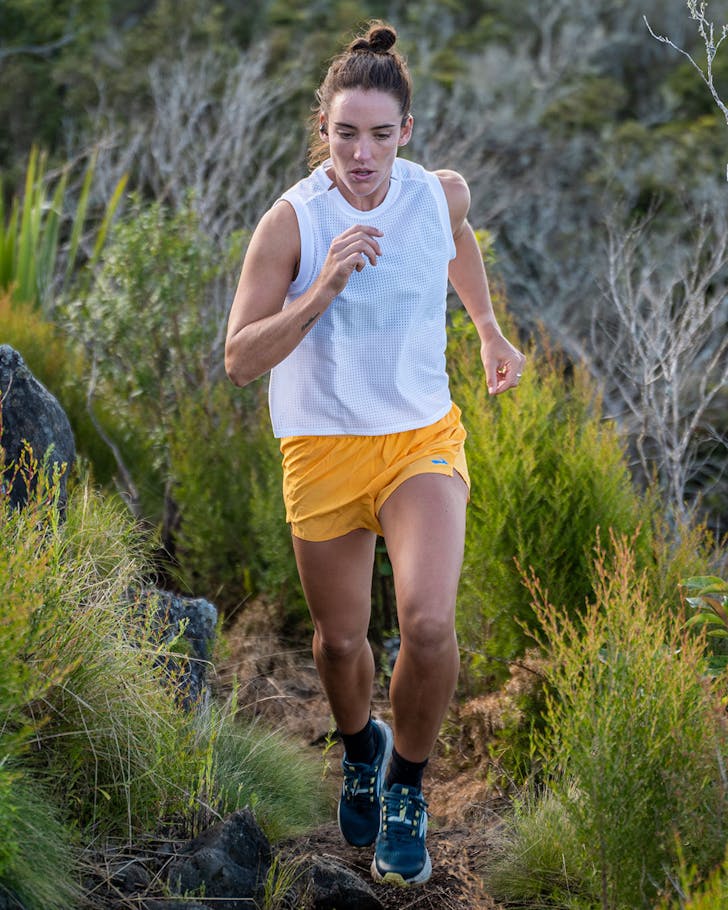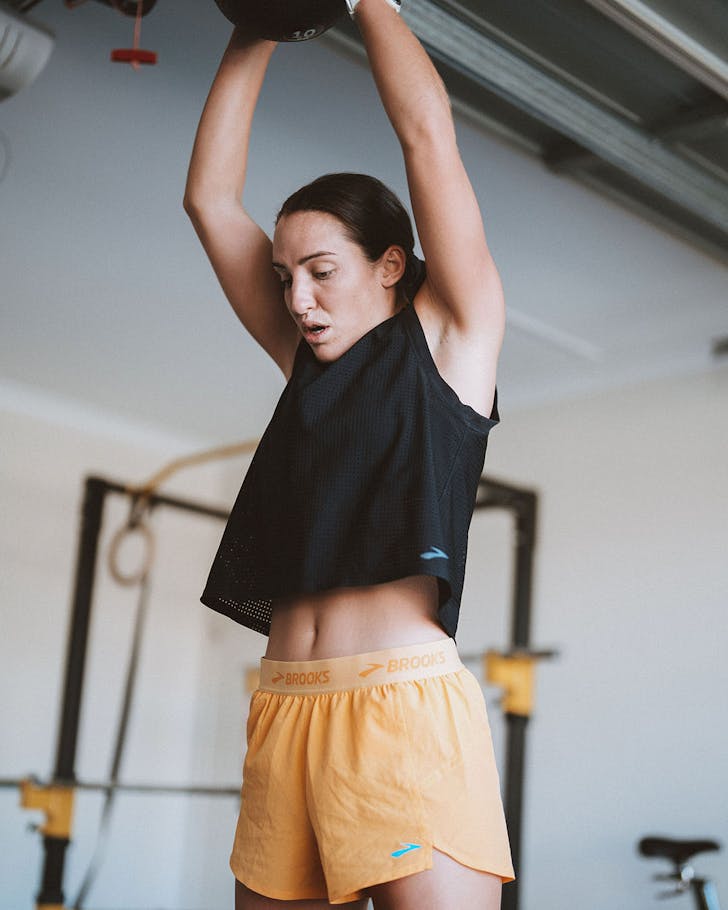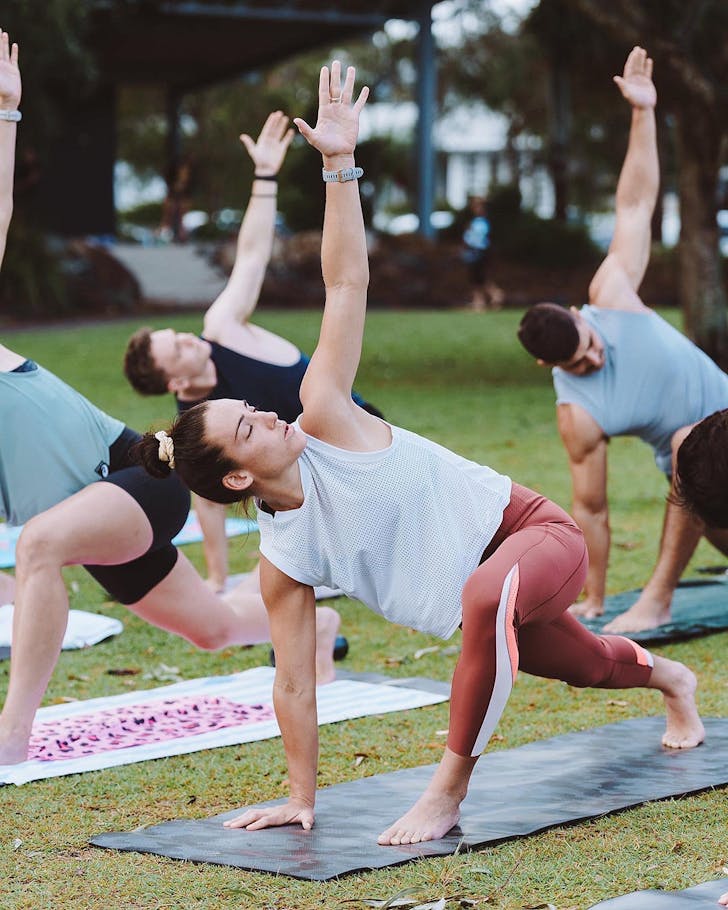Ultra Marathon Champion Jacqui Bell On Conquering Challenges One Step At A Time
Running an ultra-marathon requires patience, persistence and endurance at such high levels of intensity that it is an all-encompassing commitment to complete just one. Finishing one in every continent before the age of 27 is a whole other level altogether. In fact, it’s a world-first level—one that Jacqui Bell has conquered.
Bell holds the title of the youngest person in history to run an ultra marathon on all seven continents. Alongside an intense sense of fulfilment, this achievement has left her with a wealth of knowledge about one of the most extreme sides of running, a stack of awe-inspiring landscapes around the world, and most importantly, and wealth of knowledge about herself.
As part of The Run Up, a project to unearth the stories of some of Australia's most passionate runners to get you motivated to lace up, we chatted to Bell about what sparked a passion for this extreme sport, what motivated her to tackle a world-first challenge, and how the physical act of running ties in crucial to her mental and overall wellbeing.
Can you tell us about your running journey to date? Were you swift off the starting line, or did it take a bit of a run-up to get to where you are?
Funnily enough, long-distance running wasn’t my original passion. I was a tennis player and I wanted to become fitter and faster so began running to and from training. My first ultra-marathon was the Oxfam 100km hike with three other friends. We were all just 17 years old and that 100km was far from a walk in the park! It really challenged us both mentally and physically.
I took on a 50km Gold Coast ultra-marathon at 19 when I didn’t even know 50km was considered an ultra. I hadn’t even done a marathon yet. I came away with third place and felt on top of the world all week. This is when I got that real fire in my belly for these longer runs and caught the run bug! Honestly that endorphin high after such a challenge is one that is hard to match.

You’re the youngest person in the world to run an Ultra Marathon on all seven continents. For those of us who aren’t well acquainted with an ultra-marathon, can you give us a quick run through what’s involved?
An ultra-marathon is anything over a normal 42.2km marathon. This can range from 50km to 100km or more, and a lot of the time these are completed in a single stage (one push). The races I’m well-suited to are multi-stage ultra-marathons which are usually over 250km and run across five days with the distances being split over the days.
When I first came across these events the original plan was the Big Red Run across the Simpson Desert. As I began researching how to train and prepare, a whole new ultra-running world was presented to me. I stumbled across Racing The Planet’s, 4 Desert Grand Slam, established by Marathon Man, Dean Karnese, with the goal to complete four of the toughest endurance foot races in the world in one calendar year.
I decided to ditch the Big Red Run and take on the 4 Desert, which was 250km across the Namibian Desert in Africa, the Gobi Desert in Mongolia, the Atacama Desert in Chile and finally, Antarctica. It was only after the third race that I started to somewhat enjoy myself. That’s when I decided to continue and do a race on every continent.
What was the initial motivation to start challenging yourself to run ultra-marathons?
Initially, it was a bit of a personal challenge in the early days—a way to fulfil my inner competitiveness after not playing tennis anymore. I got a real kick out of the races but then when I was 22 and decided to take on these far bigger, multistage events, that was a last-ditch effort to save myself, to be honest. I was really struggling with my mental health, and I was in a really low place and couldn’t pull myself out of being so bogged down. I had a lot of bad habits and was in a negative loop I guess you could call it.
By signing up for these races I knew I would have to turn everything around and put everything into it. I would have to completely overhaul my health in all aspects. It wasn’t just my mental health that was battling but emotionally I felt all over the shop and physically I wasn’t in shape. Personally, I just wasn’t sure where I fit in. So, by setting myself this huge challenge of running not just one ultra-marathon but taking on the 4 Desert, I knew I would have to really commit.

Has this motivation changed over the years? What is it about the immensity of effort an ultra-marathon requires that has you hooked?
My motivation started as a way to get my health back on track and strip back everything and get to the core of what made me tick. Being out in the desert alone you are forced to face things head-on. After I dealt with these things I started to really enjoy the events and I found the work I had to put into the lead-up was very fulfilling. When COVID hit and travel was off the cards, I took on a new challenge that scared me in a different way—single-stage events.
I was terrified to do a 100km race. When it came to single-stage events, they are almost a totally different race from the multi-stage events where I was strongest. I had to learn to get quicker and give it my all in one push. This is when I began wondering how good I could get. So, I started taking my running a little more seriously and got a coach on board—my good friend Matty Abel from DBA Runners in Sydney. I showed myself that I am capable of so much more than I realized, especially when I started to see some big improvements. It is so important to continually go back to the drawing board and reflect and figure out your ‘what’ and ‘why’.
What has been your favourite destination that running has given you the opportunity to visit?
Antarctica—that place is out of this world! I mean, running alongside penguins, looking up at icebergs and the purely white landscape—I even got to see a humpback whale right beside our little zodiac boat. I said yes to doing a polar plunge (swim) into the water. That was freezing! Antarctica was beyond a wild experience for a 23-year-old and not somewhere I ever thought I would have the opportunity to visit, let alone run. I tell you what though, the seasickness on the way over was brutal!
What kind of equipment do you require when training and running for an ultra marathon?
The gear can really vary depending on the race. If you are in a single-stage event the gear is far less extensive. When it comes to a multi-stage race you need to carry all your food, clothing, medical supplies, sleeping mat + bag and all your necessities except for water and a tent. The tent is far from luxurious though and about six to eight people squeeze into one. After day two, with no showers, you gain a new perspective on the close proximities.

Your mental health advocacy is closely intertwined with your running. What is it about running that you find benefits your own happiness and mental health?
No matter what, I always feel better after a run. Even when I don’t feel like it, I try to tell myself to just take one step. I start with a walk and then kick into a jog and before I know it I have ticked off even the toughest of sessions. It is just about starting! If I can take that first step, then the biggest challenge is done.
My mental health is affected by my direct actions and I’m quite a physical person, so it’s really important that I get my body moving to set me up for the day. It puts me in the right head space to feel a balance with my emotional and mental health. I also find that running with my friends, family or girlfriend is the best way to catch up after a stressful day. There is something about jogging side by side and hearing about what they got up to in their day and it's just a really nice way to talk without distractions.
Tell us a little about the mental health initiatives you support and why.
During my 4 Desert challenge, I raised over $25,000 for the mental health charity The White Cloud Foundation. This charity believes that to have good mental health we need our physical, mental, emotional and social well-being in balance—they all work hand in hand.
I am also an ambassador for The Good Human Factory which was kicked off by Cooper Chapman a few years ago and has a strong focus on practising gratitude. Cooper uses money raised to host workshops in schools and recently held a morning walk and coffee catchup to chat and just start the day right—I love what he is doing with this.
What would you say to anyone who’s thinking about giving running a go but is yet to start?
Stop thinking, lace up and step out the door. Start with the goal of two to three times a week. Organize to meet a friend for a 45-minute walk and try to jog for 20 minutes of it. Keep it simple—it’s all about being consistent and persistent. If you are goal orientated then choose an event that is about 12-16 weeks away and then begin training for it. Be sure to only increase your overall kilometres by no more than 10 per cent each week—this is a big one for avoiding injury! Make your running fun and you’ll stick to it.
What’s your favourite thing about running—do you legit get a running high?
I love the way it makes me feel; this is #1! The post-race high is hard to replicate and as I mentioned earlier the quality of my catchups with those that I run with is very fulfilling.
Let’s talk soundtrack—podcast, bangers or nothing?
It varies! I love chit-chatting while running in good company. Otherwise, these days I lean towards no music. But if I do have my headphones with me then I will listen to anything—I let Spotify choose for me, usually. I don’t listen to podcasts too often when I run, I try to allow myself to think while running and clear my head.
Bangers or podcasts?
Beyonce, Taylor Swift, Glass Animals, Elton John, Biebs, Kygo, Pink… I also love acoustic chilled tunes so I am a mixed bag depending on the day, my mood and the run!
Editor’s note: this article was produced in partnership with Brooks. Thank you for supporting the partners who make Urban List possible. To read our editorial policy, click here.
Images: Supplied
_copy_2.jpg?format=auto,compress&w=728 728w)